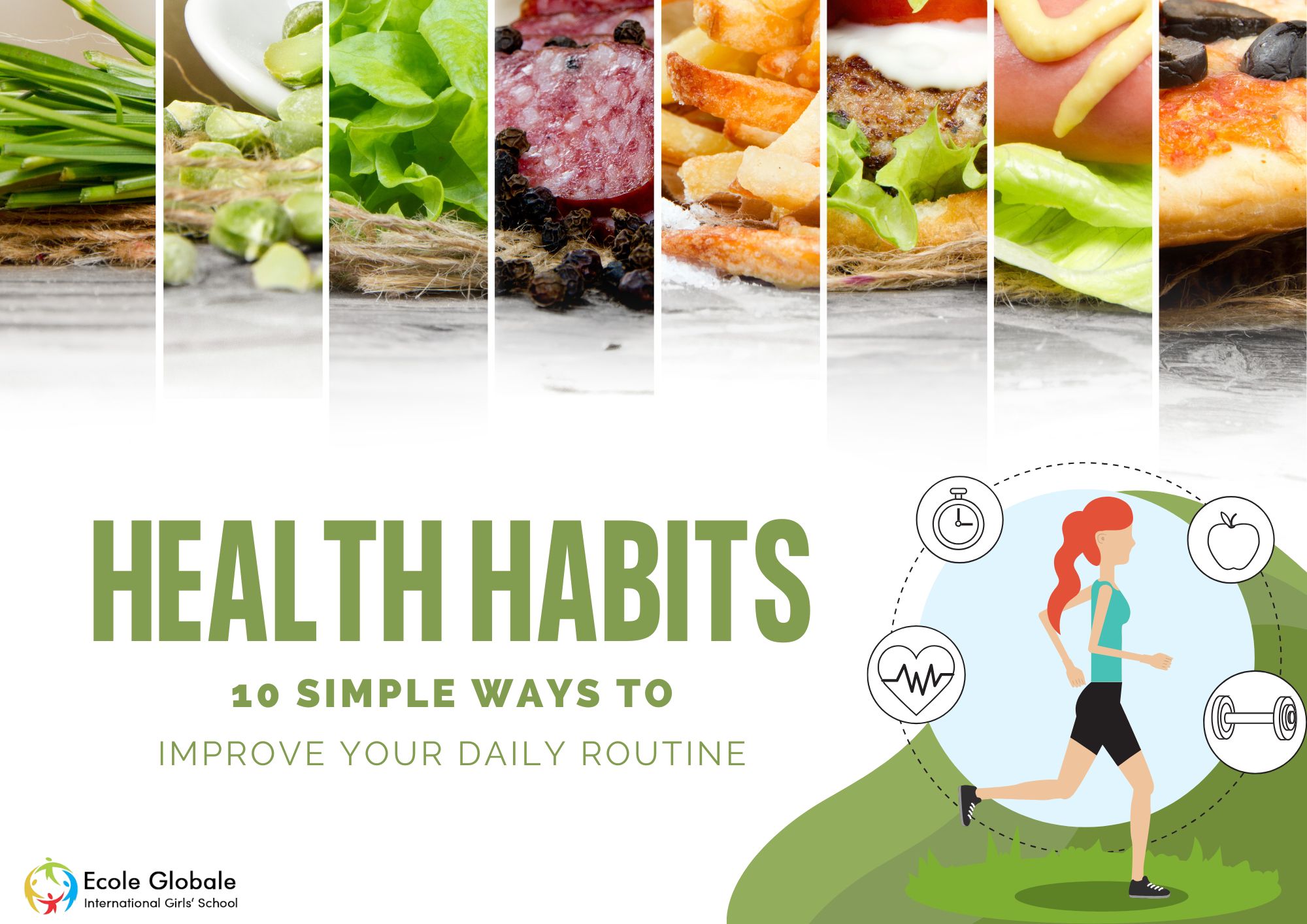Developing consistent Health Habits can have a profound impact on your well-being, especially if you’re a student juggling classes or a parent balancing work and family life.
Building a healthy lifestyle doesn’t have to be complicated or time-consuming.
Small adjustments—done regularly—can help you feel more energetic, boost your mood, and sharpen your focus so healthy diet is also makes journey easy . Below are ten simple ways to enhance your daily routine with better Health Habits.
Each suggestion caters to the busy schedules of both students and parents 10 simple habits for a healthy lifestyle, ensuring that everyone can benefit from a more balanced, vibrant life.
1. Health Habits Begin with a Balanced Breakfast
Breakfast is often called “the most important meal of the day,” and for good reason. Students need a steady supply of nutrients to stay alert in class, while parents benefit from having sustained energy to manage work and home responsibilities. A balanced breakfast, rich in protein, whole grains, and healthy fats, sets a strong foundation for the entire day.
- Choose Wholesome Options: Oatmeal, eggs, whole-grain toast, and fresh fruit provide a combination of protein, fiber, and essential vitamins.
- Smoothies on the Go: If time is tight, blend fruits, leafy greens, yogurt, or plant-based milk for a quick, nutritious meal in a cup.
- Stay Hydrated: Don’t forget to drink water in the morning. It helps kick-start your metabolism and keeps you feeling refreshed.
2. Health Habits for Active Living

Physical activity is an essential component of a well-rounded, healthy lifestyle. For both students and parents, it can be challenging to find time to exercise, but even small bursts of movement can significantly enhance energy levels and mental clarity.
- Mini Workouts at Home: Short, 10-minute workouts—like jumping jacks, squats, or quick yoga flows—can be done between study breaks or while the kids nap.
- Family Exercise Time: Go for a family walk or bike ride after dinner. It’s a fun way to bond and stay fit.
- Stay Active at School or Work: Walk during lunch breaks, take the stairs instead of the elevator, or stretch during downtime.
3. Health Habits for Proper Hydration
Water is often overlooked, yet it’s one of the simplest, most impactful Health Habits to maintain. Proper hydration helps regulate body temperature, support digestion, and improve cognitive functions—important factors for both academic performance and daily tasks.
- Carry a Water Bottle: Keep a refillable water bottle with you. This visual reminder encourages frequent sips.
- Set Hydration Goals: Aim to drink at least 6–8 glasses of water per day, adjusting for physical activity and climate.
- Infuse Flavor: If plain water feels too boring, infuse it with fruits like lemon, berries, or mint to give it a refreshing twist.
4. Health Habits That Improve Sleep Quality

A good night’s sleep is essential for both students and parents who need to be alert, productive, and emotionally balanced. Whether you have exams or a hectic work schedule, prioritizing sleep can significantly impact your overall well-being.
- Set a Consistent Bedtime: Go to bed and wake up at the same time every day to regulate your internal clock.
- Digital Detox: Avoid screens—phones, tablets, TV—at least 30 minutes before bedtime. The blue light can interfere with your body’s natural sleep rhythm.
- Create a Relaxing Routine: Activities like reading a book, journaling, or gentle stretches can help signal your body that it’s time to wind down.
5. Health Habits for Stress Management
Stress affects everyone—students worry about exams, while parents manage work deadlines and household responsibilities. Effective stress management is crucial for mental and physical health, as chronic stress can lead to fatigue, anxiety, or even weaken the immune system.
- Practice Mindful Breathing: Simple deep-breathing exercises can calm the mind and lower stress levels.
- Schedule Relaxation Breaks: Take short breaks for activities you find calming—like doodling, listening to music, or taking a walk.
- Limit Overcommitting: Learn to say “no” to tasks that overcrowd your schedule. Prioritizing your mental well-being is essential.
6. Health Habits for Better Posture and Ergonomics
In a digital age where many students and parents spend extended hours at desks or using devices, posture often takes a back seat. Poor ergonomics can contribute to neck pain, back aches, and fatigue.
- Set Up a Comfortable Workspace: Ensure your chair supports your lower back, and your computer screen is at eye level.
- Stretch Regularly: Simple stretches for your neck, shoulders, and lower back can help you reset after long periods of sitting.
- Use Proper Bag Support: For students, a backpack with wide straps worn over both shoulders distributes weight evenly. Parents who carry toddlers should opt for ergonomic carriers.
7. Health Habits for Mindful Eating

Mindful eating involves paying attention to what, when, and why you’re eating. This approach fosters a healthier relationship with food—particularly important for growing students and busy parents who may resort to convenience meals.
- Eat Without Distractions: Turn off the TV and keep smartphones away from the dinner table. Focus on the flavors, textures, and aromas of your meal.
- Portion Control: Use smaller plates and bowls to help gauge appropriate portion sizes. Overeating can lead to sluggishness.
- Involve Everyone: Cooking and eating together can teach children valuable lessons about nutrition and promote family bonding.
8. Health Habits for Social Connections
Strong social ties can play a pivotal role in mental well-being and stress management. While technology keeps us connected, there’s no substitute for face-to-face interaction or engaging conversations that enrich relationships.
- Schedule Family Time: Set aside at least one meal a day to share as a family. This fosters better communication and keeps everyone updated on each other’s lives.
- Join Clubs or Teams: Students benefit from joining school clubs or sports teams, while parents can find community groups that align with their interests.
- Engage in Community Service: Volunteering together can build empathy, teach valuable lessons, and strengthen family bonds.
9. Health Habits for Setting Realistic Goals
From homework and exams to career aspirations and parenting milestones, goal-setting is an essential skill that keeps life organized and purposeful. Setting realistic goals not only keeps you motivated but also reduces anxiety and procrastination.
- Use the SMART Approach: Specific, Measurable, Achievable, Relevant, and Time-bound goals ensure clarity and maintain progress.
- Break Tasks Down: Large goals can feel overwhelming. Divide them into smaller, more manageable steps to maintain momentum.
- Celebrate Milestones: Recognize your achievements along the way—this positive reinforcement promotes consistency in your Health Habits.
10. Health Habits for Balanced Screen Time

In today’s digital world, screens are unavoidable for both school assignments and remote work. However, too much screen time can strain your eyes, disrupt your sleep cycle, and hinder interpersonal relationships.
- Enforce Screen-Free Zones: Designate certain areas—like the dining table or the bedroom—as screen-free zones to encourage healthier boundaries.
- Follow the 20-20-20 Rule: Every 20 minutes, look at something 20 feet away for 20 seconds. This simple habit can reduce eye strain.
- Use Time-Tracking Apps: Tools that monitor screen usage can help students and parents become more mindful of their device habits.
Conclusion
Building strong Health Habits doesn’t require a radical overhaul of your life. Instead, it’s about identifying small changes that resonate with your daily routine—be it as a busy student focused on academic goals or a parent juggling multiple responsibilities.
Embracing these ten simple strategies can transform your outlook, boost your energy levels, and foster a happier, more fulfilling lifestyle.
From having a balanced breakfast to prioritizing mindful eating, each habit contributes to an overall sense of well-being. Regular physical activity, improved sleep quality, and stress management go hand in hand to keep both the mind and body in peak condition.
Meanwhile, practicing good posture, maintaining social connections, and setting realistic goals ensure a rounded approach to self-care.









